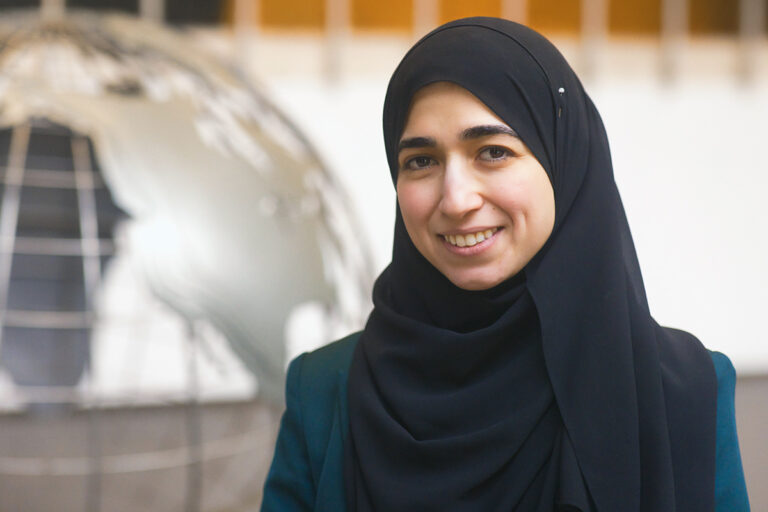The Department of Religious Studies at Michigan State University has a new undergraduate major designed to meet the growing demand for ethical, culturally competent leaders in the expanding nonprofit, philanthropic, and service sectors. The Nonprofit Leadership, Religion, and Social Change major, launched Fall 2025, blends academic study, experiential learning, community engagement, and applied research to provide students with a strong foundation to turn their passion for helping others into real-world change.
“The next generation of leaders won’t just manage organizations — they’ll reimagine how we serve communities,” said Amy DeRogatis, Professor of Religion and American Culture and Chair of the Department of Religious Studies at Michigan State University. “The new Nonprofit Leadership major, developed by the Department of Religious Studies faculty, empowers students to lead with vision, act with empathy, and partner with nonprofit organizations to build a more compassionate and equitable world. This program reflects our deep commitment to preparing students for lives of purpose and meaningful impact.”

At the undergraduate level, there is no other nonprofit major at Michigan State University. This distinctive degree, designed to prepare the next generation of nonprofit leaders and social change agents, combines global cultural awareness gained through religious studies courses with practical, hands-on learning in nonprofit management.
“Nonprofit Leadership, Religion, and Social Change is a one-of-a-kind major at MSU that does more than offer an academic education — it empowers students to be engaged citizens and compassionate changemakers,” said Morgan Shipley, Associate Professor of Religious Studies and the inaugural Foglio Endowed Chair in Spirituality. “In a world urgently in need of healing, justice, and hope, a degree in Nonprofit Leadership, Religion, and Social Change offers students the tools to become visionary leaders and compassionate catalysts for transformation. This program doesn’t just educate — it ignites a lifelong commitment to service, equity, and the power of community.”
The NRSC major is designed for service-minded, socially conscious students who are empathetic, ethical, and collaborative and wish to pursue meaningful work in values-based, mission-driven organizations. Students who care deeply about social justice, public health, environmental sustainability, education reform, and/or community development will find a home in this program.
“The new Nonprofit Leadership major, developed by the Department of Religious Studies faculty, empowers students to lead with vision, act with empathy, and partner with nonprofit organizations to build a more compassionate and equitable world.”
Dr. Amy DeRogatis
“It is critical to have culturally competent leaders who have a deep understanding of the complexities of cultural and religious beliefs, practices, and values of co-workers as well as people served by the nonprofits,” DeRogatis said. “In the United States, 49% of nonprofits are religiously affiliated; 100% of nonprofits need compassionate leaders who will have the skills the B.A. in Nonprofit Leadership, Religion, and Social Change provides.”
Graduates of the program will be prepared for impactful careers in nonprofit settings, philanthropic enterprises, public policy, civil society, social entrepreneurship, and faith-based sectors. They will be interculturally competent and ready to create, lead, and support innovative community-based initiatives that change lives and have a positive impact on communities.
“By the completion of their degree, students will be ready to lead with empathy, think critically across cultures, and drive meaningful change in communities around the world,” Shipley said. “Our students will leave not only prepared to lead, but inspired to lift others, challenge injustice, and reimagine what’s possible.”
Interdisciplinary Learning Experience
The NRSC major is highly interdisciplinary, combining coursework in religious and cultural studies with applied training and community-based learning. Students will explore what motivates individuals and communities and how worldviews and belief systems shape social action, while developing the practical and organizational skills.
Through the skills and knowledge gained, students will develop intercultural competencies that will enable them to address human, family, and civil society issues such as food and environmental justice, homelessness and rights to housing, health equity, gender equality, racial justice community development, advocacy, and more.

What makes the NRSC major stand out is its deep commitment to experiential learning. Students will engage directly with community organizations and social impact projects. Through rigorous coursework, internships, grant-writing workshops, and project-based courses, they’ll build a practical toolkit to lead nonprofits, launch social enterprise projects, and drive real social change.
“This major goes beyond theory — through project-based courses and real-world experiences, students learn how to write grants, design governance structures, build well-being initiatives, and work directly with nonprofits, NGOs (non-governmental organizations), and philanthropic organizations,” Shipley said. “The NRSC major is a dynamic, experience-driven path for students who want to make a meaningful impact.”
Through NRSC’s small, inclusive, and project-based courses, students gain practical experience while being able to collaborate and work closely with each other, with faculty, and with community partners.
“The NRSC major emphasizes cultural competency, ethical leadership, and an equity-focused mindset — essential for working effectively with diverse communities and promoting lasting social impact.”
Dr. Morgan Shipley
These experiences are designed to not only build skills but also to instill a lasting sense of civic responsibility. The NRSC major brings something deeper than a focus on project-based learning by placing a high emphasis on empathy, ethics, and cultural literacy. Graduates of the program will be able to confront complex issues — from homelessness and health equity to environmental justice and racial inequality — with both compassion and strategic insight.
“The NRSC major emphasizes cultural competency, ethical leadership, and an equity-focused mindset — essential for working effectively with diverse communities and promoting lasting social impact,” Shipley said. “Graduates are well-equipped not only for careers in the nonprofit sector but also for leadership roles in professional fields that value ethics, innovation, and social responsibility.”
Filling a Demand
The creation of the NRSC major reflects both student demand for values-based career pathways and an inherited outcome of the department’s success with the existing concentration in nonprofit leadership and the new Nonprofit Leadership, Global Cultures, and Social Enterprise M.A. and graduate certificate programs.
“It is the natural development of these initiatives and complements the existing undergraduate courses and departmental vision for applied religious studies,” DeRogatis said. “Over the years, our students have increasingly found work in the nonprofit sector and this major provides them with applicable skills to succeed in a range of nonprofit settings.”
While MSU’s Department of Religious Studies doesn’t advocate for a specific stance on religion, its overarching goal is to prepare students to recognize how religion operates in the world so they can successfully formulate and manage projects with diverse colleagues. Such an approach, when combined with faculty who are versed and experienced in the realms of nonprofits, charity, philanthropy, and social entrepreneurship, make the department an ideal home for a distinctive major that combines a humanistic education with a professional pathway for students interested in service and public engagement.

For those students considering graduate school, the major lays a strong foundation for further study in areas such as religious studies, law, community health, education, public policy, and international development. Graduates will leave with both the skills and mindset to succeed in complex, people-centered environments.
The new major also offers a shared degree with the department’s existing online master’s program. Advanced undergraduates can transfer up to eight credits from their bachelor’s degree into the M.A. in Nonprofit Leadership, Global Cultures, and Social Enterprise, potentially completing the graduate program in just one additional year.
“It is truly a joy to mentor and work with students as they engage with the very best of humanities education,” said Laura Yares, Associate Professor in the Department of Religious Studies at Michigan State university, “as they learn about the religious, linguistic, ethnic, and cultural diversity of humanity in the context of a program that prepares them for careers in which they can be part of the change that they want to see in their communities, and in the world writ large.”
By Austin Curtis and Kim Popiolek


